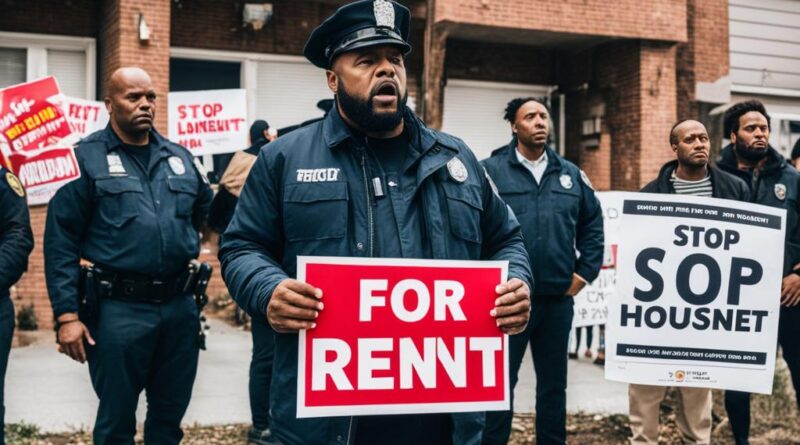Stop Landlord Harassment in Los Angeles Now
Tenants in Los Angeles have the legal right to “peace and quiet enjoyment” in their rental properties. This means that they should not be unreasonably bothered or disturbed by their landlords. Landlord harassment can include threats, verbal abuse, refusal to make repairs, and other actions that disrupt the tenant’s peace and quiet. The City of Los Angeles has implemented the Tenant Anti-Harassment Ordinance (TAHO) to protect tenants from such harassment.
Under TAHO, tenants have the right to sue their landlord and seek compensation for the harm caused. They can also use harassment as a defense in eviction cases. Landlords who engage in harassment can face criminal charges and penalties. It is important for tenants to know their rights and take action if they are being harassed by their landlord.
Key Takeaways:
- Tenants in Los Angeles have the legal right to “peace and quiet enjoyment” in their rental properties.
- Landlord harassment includes threats, verbal abuse, refusal to make repairs, and other actions that disrupt the tenant’s peace and quiet.
- The Tenant Anti-Harassment Ordinance (TAHO) provides legal protections for tenants in Los Angeles.
- Under TAHO, tenants can sue their landlord, seek compensation, and use harassment as a defense in eviction cases.
- Landlords who engage in harassment can face criminal charges and penalties.
How to Take Legal Action Against Landlord Harassment
Tenants who are experiencing harassment from their landlord have two main options for taking legal action. First, they can sue their landlord in small claims court or with the help of a lawyer outside of small claims court. In a small claims court, the maximum amount of compensation that can be awarded is $10,000. If the tenant wins their case, the court can order the landlord to pay for the harm caused, decrease the amount of rent owed, impose penalties on the landlord, provide relocation expenses, issue a court order to stop the harassment, and any other appropriate action.
Second, tenants can use harassment as a defense in eviction cases. They can inform the court about the harassment and present evidence to support their claim. It is important for tenants to take prompt action and seek legal advice to protect their rights and combat landlord harassment effectively.
“The court can order the landlord to pay for the harm caused, decrease the amount of rent owed, impose penalties on the landlord, provide relocation expenses, issue a court order to stop the harassment, and any other appropriate action.”
Legal Actions Against Landlord Harassment
| Legal Action | Possible Outcomes |
|---|---|
| Suing in small claims court | Compensation for harm caused, rent reduction, penalties, relocation expenses, court order to stop harassment |
| Using harassment as a defense in eviction cases | Protection from eviction, potential compensation for harm caused |
Understanding Landlord Harassment and Legal Protections in California
Landlord harassment is a common issue faced by tenants in California. It refers to actions or strategies used by landlords to force, intimidate, or disrupt the peace and comfort of tenants with the purpose of making them move out. This can take various forms, including violation of privacy, refusal to make necessary repairs, threats, and intimidation.
However, California state law and local city ordinances provide legal protections for tenants against harassment. These laws ensure that tenants have the right to live peacefully in their rented properties without being subjected to any form of harassment. In rent-controlled jurisdictions like Los Angeles, additional regulations are in place to prevent landlords from harassing tenants in order to raise the rent.
It is crucial for tenants to be aware of their rights and the laws that protect them from landlord harassment. By understanding their rights and the legal recourse available to them, tenants can take appropriate action and fight against any form of harassment they may face.

“Tenants have the right to live peacefully in their rented properties without being subjected to harassment.”
How to Report Landlord Harassment and Seek Legal Recourse
Tenants who are experiencing landlord harassment can take several steps to report the harassment and seek legal recourse.
It is crucial for tenants to document each incident of harassment by keeping a log with dates and times, saving texts and emails with the landlord, getting statements from witnesses, and taking photos or videos when applicable.
In serious cases, tenants should contact the local housing agency or seek the assistance of a lawyer. There are several organizations and resources available to help tenants who are facing landlord harassment, such as the Los Angeles Housing + Community Investment Department and the San Francisco Rent Board.
Tenants can also file a lawsuit against their landlord in small claims court or higher courts, depending on the complexity of the case. Legal action can result in the landlord being held accountable for damages, punitive damages, and tenant attorney expenses.
| Action Steps | Benefits |
|---|---|
| Document incidents of harassment | Strong evidence for legal action |
| Contact local housing agency or lawyer | Expert guidance and support |
| Utilize resources like LA Housing Department and SF Rent Board | Access to specialized assistance |
| File a lawsuit in small claims court or higher courts | Legal recourse and potential compensation |
Conclusion
Landlord harassment is a serious issue that can have a significant impact on tenants’ rights and overall well-being. Fortunately, tenants in Los Angeles have legal protections in place to combat such harassment and ensure a safe and peaceful living environment.
When facing landlord harassment, it is crucial for tenants to be aware of their rights and take appropriate action. They have the right to take legal measures against their landlord, whether through small claims court or with the assistance of a lawyer. By doing so, tenants can seek compensation for the harm caused, hold the landlord accountable, and put an end to the harassment.
Keeping detailed records of incidents, including dates, times, and any communication, is essential. These records can serve as valuable evidence when pursuing legal action. Additionally, seeking legal advice can provide tenants with guidance and support throughout the process.
By standing up for their rights and taking necessary actions, tenants can assert their tenant rights in Los Angeles, protect themselves from landlord harassment, and ensure a peaceful and enjoyable living environment.
FAQ
What is landlord harassment?
Landlord harassment refers to actions or strategies used by landlords to force, intimidate, or disrupt the peace and comfort of tenants in order to make them move out.
What are some examples of landlord harassment?
Examples of landlord harassment include threats, verbal abuse, refusal to make repairs, violation of privacy, and intimidation.
What legal protections do tenants in Los Angeles have against landlord harassment?
Tenants in Los Angeles have the legal right to “peace and quiet enjoyment” in their rental properties. The City of Los Angeles has implemented the Tenant Anti-Harassment Ordinance (TAHO) to protect tenants from harassment. They can also use harassment as a defense in eviction cases.
How can tenants take legal action against landlord harassment?
Tenants can sue their landlord in small claims court or with the help of a lawyer outside of small claims court. They can also use harassment as a defense in eviction cases.
What should tenants do if they are experiencing landlord harassment?
Tenants should document each incident of harassment, contact the local housing agency or seek the assistance of a lawyer, and utilize available resources such as the Los Angeles Housing + Community Investment Department or the San Francisco Rent Board.
What can legal action against landlord harassment result in?
Legal action can result in the landlord being held accountable for damages, punitive damages, and tenant attorney expenses.
How can tenants ensure a peaceful living environment and stop landlord harassment?
By knowing their rights, keeping detailed records of incidents, and taking legal action when necessary, tenants can put an end to landlord harassment.

